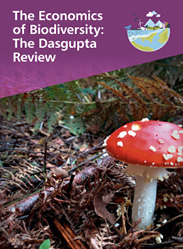FST JOURNAL
Biodiversity
Nature: a blind spot in economic theory
A fundamental change in how we think about and approach economics is needed if we are to reverse biodiversity loss and protect and enhance our prosperity, an independent, global review on the economics of biodiversity has reported.

The independent review led by Professor Sir Partha Dasgupta presents a comprehensive economic framework for biodiversity. It calls for urgent and transformative change in how we think, act and measure economic success to protect and enhance our prosperity and the natural world.
Grounded in a deep understanding of ecosystem processes and how they are affected by economic activity, the new framework presented by the Dasgupta Review sets out the ways in which we should account for nature in economics and decision-making.
Part of nature
It states that we are part of nature, not separate from it. We rely on nature to provide us with food, water and shelter; regulate our climate and disease; maintain nutrient cycles and oxygen production; and provide us with spiritual fulfilment and opportunities for recreation and recuperation, which can enhance our health and wellbeing.
We also use the planet as a sink for our waste products, such as carbon dioxide, plastics and other forms of waste, including pollution.
Nature is therefore an asset, just as produced capital (roads, buildings and factories) and human capital (health, knowledge and skills) are assets. Like education and health, however, nature is more than an economic good: many value its very existence and recognise its intrinsic worth too.
Biodiversity enables nature to be productive, resilient and adaptable. Just as diversity within a portfolio of financial assets reduces risk and uncertainty, so diversity within a portfolio of natural assets increases nature’s resilience to shocks, reducing the risks to nature’s services. Reduce biodiversity, and nature and humanity suffer, notes the Review.
The Review argues that nature is our most precious asset and that significant declines in biodiversity are undermining the productivity, resilience and adaptability of nature. This in turn has put our economies, livelihoods and wellbeing at risk.
It finds that humanity has collectively mismanaged its global portfolio of assets, meaning the demands on nature far exceed its capacity to supply the goods and services we all rely on.
The Review makes clear that urgent and transformative action taken now would be significantly less costly than delay and will require change on three broad fronts:
- Humanity must ensure its demands on nature do not exceed its sustainable supply and must increase the global supply of natural assets relative to their current level. For example, expanding and improving management of Protected Areas; increasing investment in nature-based solutions; and deploying policies that discourage damaging forms of consumption and production.
- We should adopt different metrics for economic success and move towards an inclusive measure of wealth that accounts for the benefits from investing in natural assets and helps to make clear the trade-offs between investments in different assets. Introducing natural capital into national accounting systems is a critical step.
- We must transform our institutions and systems – particularly finance and education – to enable these changes and sustain them for future generations. For example, by increasing public and private financial flows that enhance our natural assets and decrease those that degrade them; and by empowering citizens to make informed choices and demand change, including by firmly establishing the natural world in education policy.
The Government has welcomed the Review’s final report and is expected to respond formally to the Review’s findings in due course.
www.gov.uk/government/publications/final-report-the-economics-of-biodiversity-thedasgupta-review
